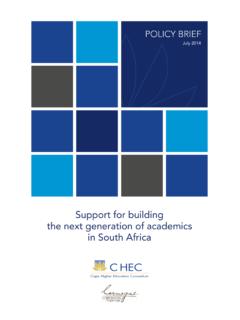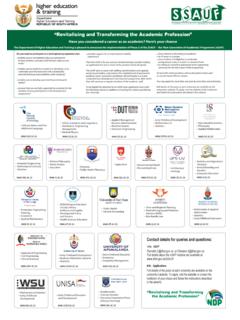Transcription of Research to Support the Planning Work of the ICT …
1 1 Research to Support the Planning Work of the ICT Working Group of the City of cape town (CoCT) and the cape Higher Education Consortium (CHEC) By Oswald Jumira June 2009 Abstract The City of cape town (CoCT) and cape Higher Education Consortium (CHEC) are striving to work together in Information Communication Technologies (ICT) collaborative Research and projects aimed at increasing ICT access and awareness, e-skills and improving on service delivery through use of ICTs. There is need to build integrated and sustainable partnerships which are destined to consolidate the City of cape town s status as the Rising Urban Star . This report examines a number of ICT collaborative Research case studies, an analysis of ICT Research centres, Information Communication Technologies for Development (ICT4D) case studies and includes consultations with ICT researchers to help identify a framework of best practices for successful collaborative projects. Within this report there is also information regarding previous and current ICT projects and researches between CHEC members and CoCT.
2 We also managed to identify potential ICT collaborative Research areas and the required capacity to help carry through the projects for the City of cape town . 2 Table of Contents Background .. 4 1. Introduction .. 5 2. ICT Case Study s and Research Centres .. 7 ICT4D Centre .. 7 Centre for Information Technology and Development in Africa (CITANDA) .. 8 Informatics Development for Health in Africa (INDEHELA) .. 9 E-learning Development and Support Unit (EDSU) .. 11 Africa Virtual Open Initiatives and Resources (AVOIR) .. 12 Students Health and Welfare Centres Organisation (SHAWCO) .. 13 Athlone Living Labs (ALL) .. 14 Digital Doorway Project, eThekwini Municipal Area .. 16 Knowledge Management in Electronic Delivery of Municipal Services, Mangaung Local 17 Cofisa Project (Initiative) .. 18 Joburg Centre for Software Engineering, Johannesburg .. 19 SATELLIFE PDA Project, 20 E-Governance for African Municipalities, Lusaka City Council Zambia .. 20 Municipal Services through ICTs (Rural-urban partnership programs), Nepal.
3 21 E-Learning Programs, Philippians .. 23 SARI Project, 25 CEMINA: Strengthening Women's Leadership in Community Development through Radio Internet in Brazil .. 26 Latvia university of Agriculture (LLU) and Jelgava City Municipality in a Knowledge-based Society, Latvia .. 28 Municipality of Yalova, Turkey .. 29 3 Joint Municipality Venture to Create a New e-Service Platform, Sweden .. 32 eTrikala: A digital City, Greece .. 35 EUREA project: Collaboration between LERU universities in terms of higher education and teaching through ICT, Italy .. 36 Innovations Hubs, Barcelona 38 OSKE Gateway to Finish Experience, Finland .. 40 Science Centre, Philadelphia, USA .. 41 3. ICT Projects within CoCT and CHEC Members .. 44 Previous and Current ICT Collaborations within CHEC Member Universities .. 44 Current e-Governance ICT Projects being undertaken by the CoCT .. 45 Projects between CoCT and a specific CHEC member .. 46 4. Best Practices for collaborations in ICTs .. 48 Pre-project Best Practices.
4 48 Project Rollout Best Practices .. 51 Post-project Best Practices .. 53 Lessons Learned .. 55 Summary .. 57 5. Potential collaboration areas in ICTs .. 59 6. Capacity for collaborations in ICTs .. 64 7. Conclusions .. 66 Bibliography .. 68 4 Background On the 23 of November 2007 the City of cape town (CoCT) and the cape Higher Education Consortium (CHEC representing cape Peninsula university of Technology, university of cape town , university of the Western cape and Stellenbosch university ) resolved to establish a sustainable and non exclusive partnership. A Collaboration Protocol, which was signed between the CoCT and CHEC in October 2008, commits the two parties to work towards achieving growth and development related to social, economic and environmental goals within the City s area of jurisdiction, and to realizing the full potential of the City . In terms of this Protocol, Information Communications Technology (ICT) has been identified as a key area for collaboration and was established as one of the Working Groups, which would: promote access to and awareness of ICT; Support ICT skills development; enhance municipal service delivery through the use of ICT; and Support for a dynamic ICT sector in the CoCT.
5 The Working Group through a researcher has set out to identify local and international best practices (through, amongst others, a literature survey) of collaboration in the area of ICTs between higher education and city/regional authorities. They have also requested the researcher to undertake discussions with academics from CHEC member institutions, officials of the CoCT and other relevant experts/stakeholders including business, to identify potential project areas and modalities. From the investigation recommendations are to be made to the Working Group on areas of potential collaboration, with an indication of the mode of interaction and required capacity for implementation in the universities and CoCT. 5 1. Introduction South Africa is a lower middle-income developing country which, at the moment, finds itself at the intersection of many forces of change. At the local level, entrenching democracy, growing the economy and eradicating poverty are some of South Africa's highest priorities.
6 On a global level, South Africa is one of many countries seeking to optimise participation in global markets and successfully integrate new and emerging technologies into society. cape town being one of the major cities in South Africa shares the country s vision and is spearheading a lot of initiatives focusing on developing the city and leading the city into the digital age. The CoCT is developing ICTs within its communities destined at improving ICT awareness, skills development and service delivery. Information Communication Technology (ICT) is an umbrella term that covers all advanced technologies in collection, storage and dissemination of information. ICTs are one of several major, new technologies present in our social, economic and political systems. ICTs have a continuing and dynamic presence in our society, impacting on the present and the future. While it may be".. easy to dismiss the future development of ICTs as simply a process of 'roll-out', or the diffusion of already established technologies, "taking such a perspective would be a grave error.
7 There is much to be won, and lost, in the next few years in terms of the development of information communication technologies." (UK Department of Trade and Industry: (2002) a scenario for success in 2005: Information and Communications Technology in the UK). The CoCT and CHEC have directed their attention to ICTs and the current and future impacts it has on cape town and South African society. Although Research on the impact of ICTs is relevant in many of the researches currently being done or previously done there is need to focus on integrating effectively new and emerging ICTs within the communities. That emphasis is premised on the assumption that cape town needs to unlock the relationship between knowledge, technology, and the uniquely cape town social and economic development realities that the city faces. Much of cape town s diversity and uniqueness provides opportunities for exciting Research on local technologies, especially in the area of ICT. In that way, these ICT collaborative Research initiatives seek to attract researchers from scientific, engineering and technological disciplines from different institutions in the quest to Support the design, development and application of new technologies in innovative ways to close the gap in the digital divide, service delivery, skills development and ICT awareness.
8 A lot of Research on a number of case studies has been conducted on ICT4D projects to identify best practices and lessons learned. The information is readily disseminated in order to Support the success of future projects and constantly raise the bar in development efficacy. This Research undertook to study specific projects within ICT Centres, at CHEC member universities and other academic institutions, and case studies within the ICT sector in developing and developed 6 countries. The Research findings are based on case study analysis and consultations with relevant researchers in the ICT academic and industrial field who have worked on individual and collaborative ICT projects over the years. Their successes, challenges and failures created a foundation for a concrete definition of practical collaborative best practices for accomplishing ICT projects. From the consultations and the analysis of the main aims of the Research we managed to come up with potential ICT Research collaborative areas between CHEC and CoCT within the cape town community and also looked at the available capacity that will lead to success of the projects.
9 The report is structured as follows, Chapter 2 gives an account of ICT collaborative Research projects through presentation of case studies and Research centres within most of the CHEC member universities and other universities in and outside South Africa. We also have in this Chapter, examples of success stories of Innovation Centres and Technopaks that have been driven by ICTs in developed countries. Chapter 3 gives a summary of the previous and current collaborative ICT projects and Research between the CHEC member universities and CoCT. In this section we also look briefly at the ICT projects the CoCT has been working on over the years. Chapter 4 details the best practices for collaborative ICT Research taking into account frameworks for ICT4D projects which are mainly for less developed or developing countries which share a lot of similarities and scenarios with ICT projects in low income communities in cape town . The potential collaborative areas within the ICT sector for the cape town community are discussed in Chapter 5.
10 Chapter 6 looks at the capacity that the CoCT and CHEC members possess in order to take up some of the potential projects or Research areas. Chapter 7 concludes the presentation of the Research findings and a bibliography follows thereafter. 7 2. ICT Case Study s and Research Centres A brief account of ICT Research centres, ICT collaborative researches and ICT4D case studies is presented below: ICT4D Centre In response to a growing need within industry and academia, in 2008, The university of cape town established a Research centre to investigate the use of ICTs in a developing world context. The goals of the centre are to provide academic leadership and shape this field so that it best serves those peoples and regions yet to fully engage with digital technology. The centre currently produces MSc and PHD students in the field of are in the process of developing taught courses so that others can gain the necessary skills to work in ICT4D. The centre takes a multi-disciplinary, human-centred approach to the creation of technology.










